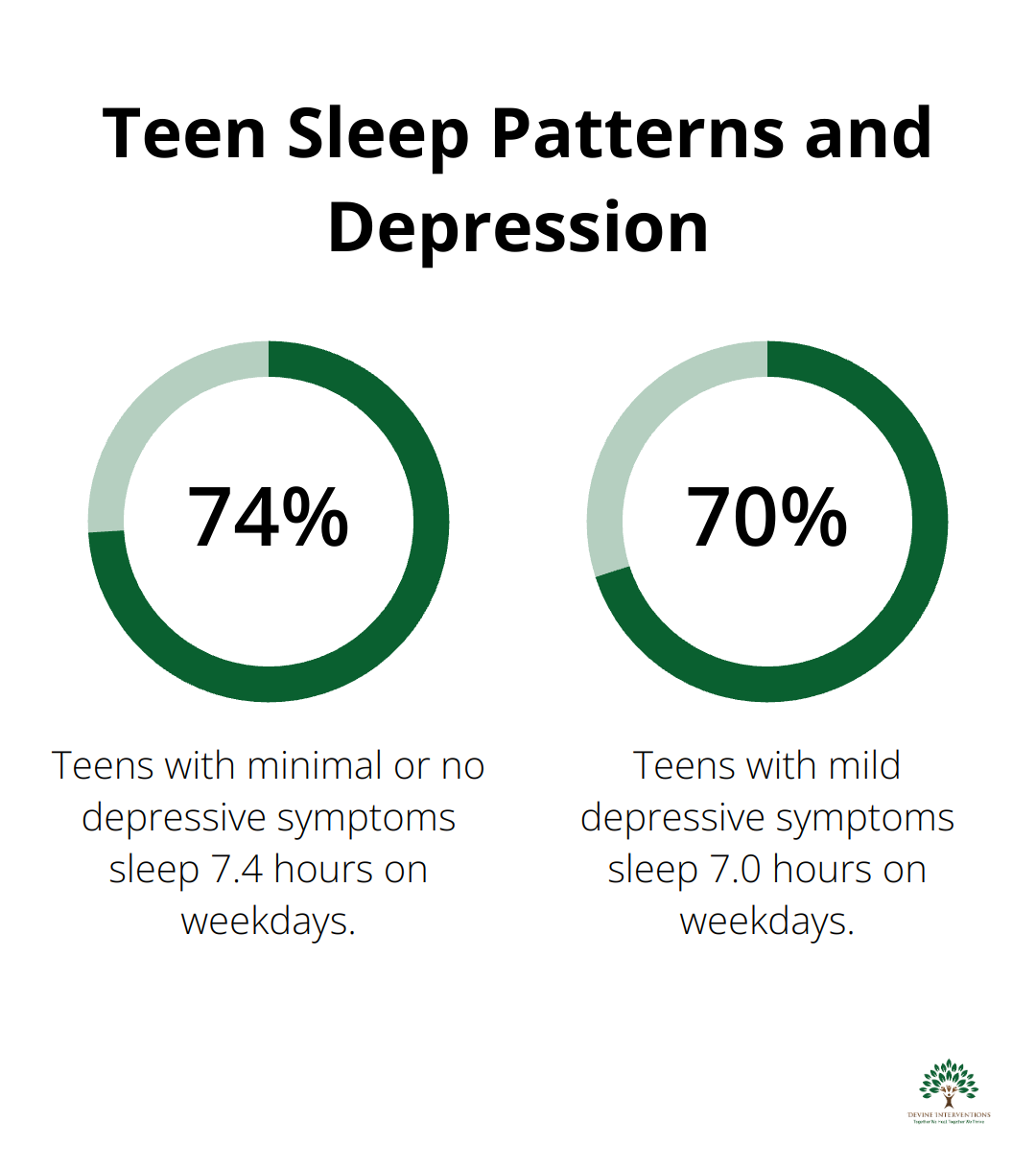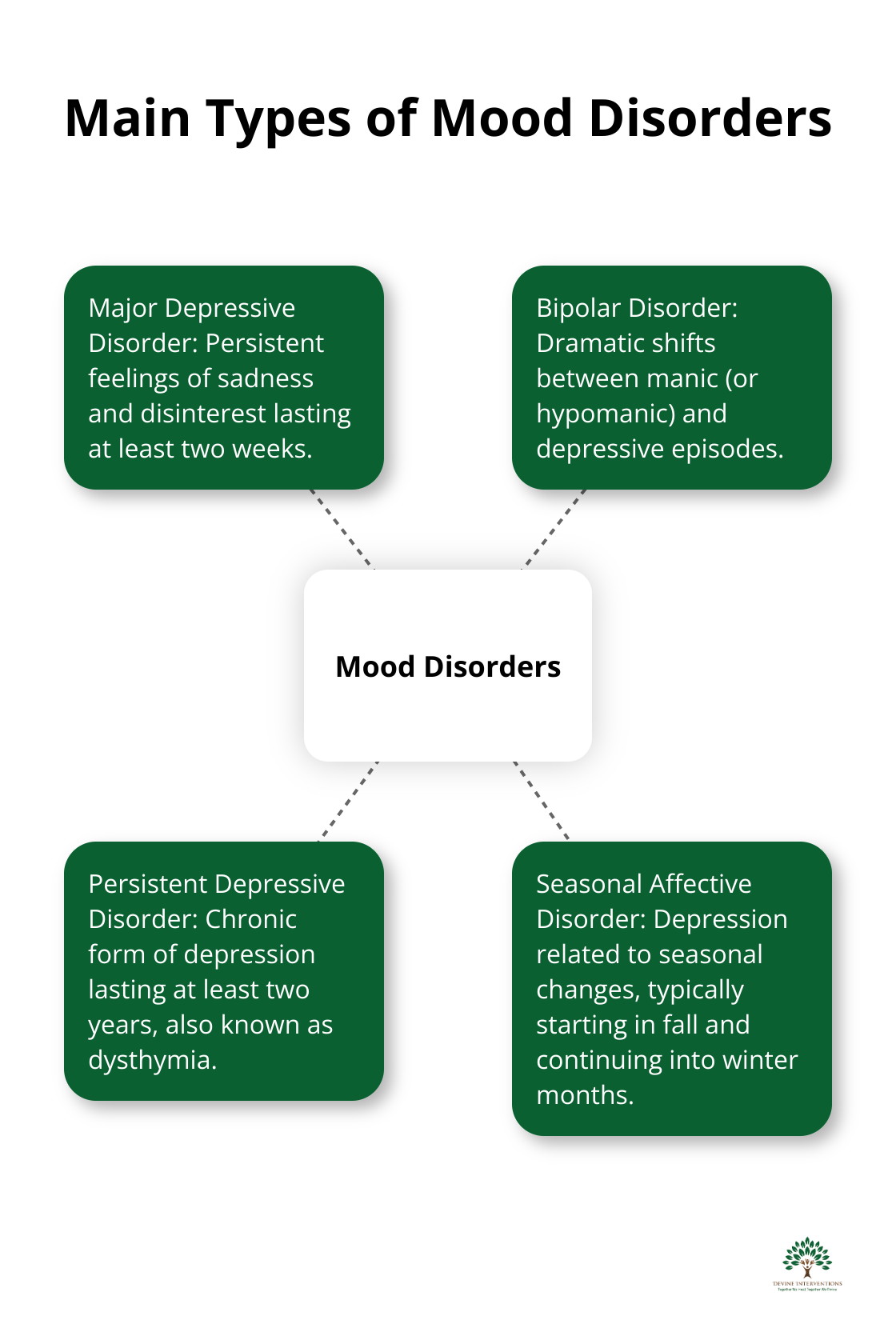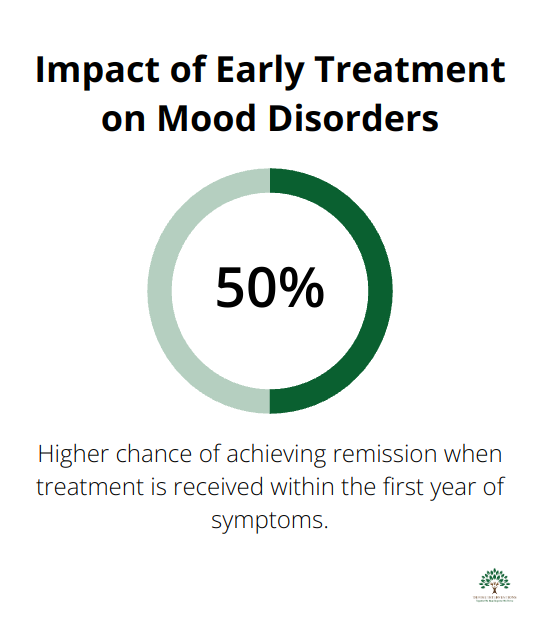Mood disorders can profoundly impact daily life, affecting emotions, thoughts, and behaviors. At Devine Interventions, we understand the challenges these conditions present and the importance of recognizing their signs early.
Our team of trusted psychiatric professionals is here to guide you through understanding and managing mood disorders. This post will explore common symptoms, types of mood disorders, and how to seek help effectively.
Recognizing Mood Disorder Red Flags
Mood disorders often sneak up slowly, making their signs hard to spot. At Devine Interventions, we’ve seen how early recognition leads to better outcomes. Let’s explore key indicators that might signal a mood disorder.
The Emotional Rollercoaster
Extreme mood swings stand out as a primary sign. You might feel elated one day and utterly hopeless the next. These shifts aren’t just “bad days” – they disrupt your life intensely. If this sounds familiar, it’s time to talk to a professional.
When Joy Disappears
Another red flag is the loss of interest in activities you once loved. Perhaps you used to enjoy painting or sports, but now can’t find the energy. This isn’t mere boredom – it’s a potential sign of depression. Our team at Devine Interventions can help you rediscover your passions.
Sleep Disturbances
Changes in sleep patterns often accompany mood disorders. You might sleep excessively or battle insomnia. Recent research shows that teens with minimal or no depressive symptoms reported significantly more weekday sleep (7.4 hours) compared to those with mild (7.0 hours) and moderate-to-severe depressive symptoms. If your sleep patterns have shifted dramatically, it could indicate more than just stress.

The Fog of Indecision
Watch for difficulty in concentrating or making decisions. Your brain might feel foggy, unable to focus or choose even simple things. This can impact your work, relationships, and daily life (and it’s not laziness – it’s a real symptom that needs attention).
The Weight of Persistent Sadness
Persistent feelings of sadness or emptiness that last for weeks are a major concern. This isn’t just feeling blue – it’s a deep, ongoing sadness that doesn’t lift. If you’re experiencing this, remember: you’re not alone, and help is available.
Recognizing these signs is your first step towards healing. Our team of experienced professionals at Devine Interventions stands ready to provide the support and treatment you need to regain balance and joy in your life. Don’t wait to seek help – early intervention can transform your recovery journey.
As we move forward, let’s explore the different types of mood disorders. Understanding these distinctions can help you identify which specific condition might be affecting you or your loved ones. Mood and behavior changes can also be indicative of other conditions, so it’s important to consult with a healthcare professional for an accurate diagnosis.
What Are the Main Types of Mood Disorders?
Mood disorders manifest in various forms, each with distinct characteristics. Understanding these differences can significantly impact your journey to seeking appropriate help. Let’s explore the main types you should know about.

Major Depressive Disorder: Beyond Ordinary Sadness
Major Depressive Disorder (MDD) involves persistent feelings of sadness, hopelessness, and disinterest in daily activities. It’s not just a case of feeling down; it’s a pervasive state that lasts for at least two weeks. If you struggle to find joy in once-loved activities or feel overwhelmed by sadness, it’s time to reach out for professional help.
Bipolar Disorder: Navigating Emotional Extremes
Bipolar disorder involves dramatic shifts between manic (or hypomanic) and depressive episodes. These mood swings can disrupt daily life intensely. It’s important to recognize that what might feel like productivity during manic phases can lead to risky behaviors and burnout. If you notice extreme highs followed by deep lows, professional intervention can provide the stability you need.
Persistent Depressive Disorder: The Enduring Challenge
Also known as dysthymia, Persistent Depressive Disorder is a chronic form of depression that lasts at least two years. While it might not be as severe as major depression, its long-term nature can significantly impact quality of life. If you’ve felt down for an extended period but still manage day-to-day life, don’t dismiss it. Long-term support can make a substantial difference.
Seasonal Affective Disorder: When Weather Impacts Mood
Seasonal Affective Disorder (SAD) is a type of depression related to seasonal changes, typically starting in fall and continuing into winter months. If you notice a pattern of feeling down as the days shorten, it’s not just “winter blues.” Light therapy, medication, and psychotherapy can effectively treat this condition.
Understanding these distinctions is vital for obtaining the right help. Don’t let confusion about your symptoms prevent you from seeking assistance. Professional guidance can provide clarity and support every step of the way. As we move forward, let’s explore how to seek help from psychiatric professionals and what you can expect during this process.
How to Get Professional Help for Mood Disorders
The Importance of Early Action
Don’t delay seeking help for mood disorders. Research published in the Journal of Clinical Psychiatry reveals that individuals who received treatment within the first year of experiencing symptoms had a 50% higher chance of achieving remission compared to those who postponed treatment. This statistic underscores the value of prompt intervention.

What to Expect During a Psychiatric Evaluation
Your first appointment will involve a comprehensive assessment. This process typically includes a general medical and psychiatric evaluation, as well as a mental status examination. A mental health professional will discuss your symptoms, medical history, family background, and current life situation. They’ll also inquire about your goals and collaborate with you to create a personalized treatment plan.
Effective Treatment Options
Evidence-based treatments for mood disorders include:
- Cognitive Behavioral Therapy (CBT): This therapy helps you identify and change negative thought patterns and behaviors.
- Medication Management: For some individuals, medication can effectively treat mood disorders. Psychiatric providers offer comprehensive medication management for all ages.
- Intensive Outpatient Programs (IOP): These programs provide structured support through group therapy, individual counseling, and skill-building sessions.
Your treatment plan will be tailored to your specific needs and may involve a combination of these approaches.
Benefits of a Comprehensive Care Approach
A comprehensive care approach addresses not just your symptoms but your overall well-being. This might include connecting you with community resources, helping you manage stress, and working on lifestyle factors that impact your mental health.
A study found that collaborative care can be effective in reducing symptoms of depression.
Taking the First Step
Seeking help can feel daunting, but it’s a powerful move towards reclaiming your life. If you notice signs of a mood disorder, reach out to a mental health professional. At Devine Interventions, we support you throughout your journey to better mental health.
Final Thoughts
Mood disorders impact daily life through various symptoms, from persistent sadness to extreme mood swings. These conditions require prompt attention and professional intervention for effective management. Early recognition and action lead to better treatment outcomes, emphasizing the importance of seeking help when signs appear.
Professional support provides clarity, direction, and evidence-based treatments for mood disorders. A comprehensive psychiatric evaluation can uncover the specific challenges an individual faces and guide the development of a tailored treatment plan. Cognitive Behavioral Therapy, medication management, and Intensive Outpatient Programs offer effective ways to manage symptoms and work towards recovery.
Seeking help for mood disorders demonstrates strength and self-awareness. At Devine Interventions, we offer services designed to address your unique needs (including specialized care for various mood disorders). Our experienced team stands ready to provide compassionate, evidence-based support throughout your journey to better mental health.







